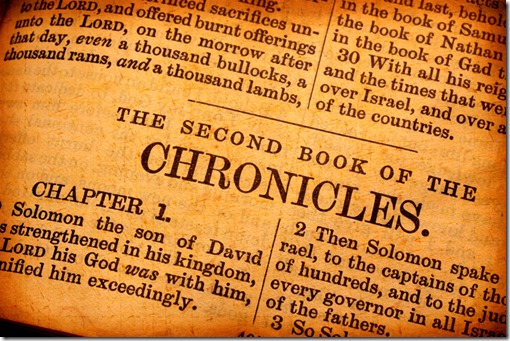
The Surprising Reason Chronicles is in the Bible
 Why is the book of Chronicles in the Bible?
Why is the book of Chronicles in the Bible?
It was written after the book of Kings and covers much of the same material, from the end of Saul’s reign until the final destruction of Jerusalem in 586 B.C.E.
Chronicles tacks on at the very end that Cyrus the Great of Persia allowed the exiles to return to Jerusalem, but for the most part the two books cover the exact same period in Israel’s history.
Chronicles even has whole sections of Kings that the writer copy and pasted into his work, not even bothering to put it in his own words.
I guess plagiarism wasn’t a thing back then.
Boy, those were the days.
Why have two rather large books covering the same material included in the collection of sacred writings? Historians like to use both books to reconstruct what actually happened, supplementing Kings with information from Chronicles and vice versa.
In other words, neither by themselves give an complete portrayal of the history of the day; two books were needed to do so.
Some claim that the two books cover the same era but from different perspectives. One writer says that Kings is written from a prophetic perspective and Chronicles is written from a priestly perspective.
Another says that Kings looks at things from an earthly perspective while Chronicles looks at things from a heavenly perspective.
When you start to talk about perspectives, however, you are moving away from the straightforward writing of history into an interpretation of that history.
The truth is, however, that the writer of Chronicles didn’t just think it would be nice for everyone to have a different, complementary perspective from Kings; he felt it was a necessity. Essential. Imperative.
He didn’t like what Kings said. He opposed it. He didn’t write a complementary account, he wrote an alternative account, a competing account.
The book of Kings is, ironically, anti-king. It presents the monarchy in a bad light, as a bad idea.
Saul is a failure from the start. David starts out OK but in the end is a foolish, impotent old man who can’t even control his kids—or his wife.
In Kings, the temple is a good idea until Solomon essentially enslaves the common man to build it and then turns it into a palace of foreign wives and foreign gods. By the end of the book the temple is a hotbed of corruption, idolatry, and oppression and is rightfully destroyed by Babylonians.
Chronicles is in favor of the monarchy. It whitewashes David—there is barely a mention of Bathsheba, and no mention of the murder of her husband—and presents him as the ideal king who conquered foreigners and destroyed their gods.
Solomon is great because he builds the temple, which the priest-writer of Chronicles loves since that’s from where, along with the monarchy, he derives his position and power.
The writer of Chronicles goes on in the books of Ezra and Nehemiah to kick out all the foreigners so that Israel will worship the Lord according to the Law, with obedience and purity, in a rebuilt temple with a Davidic king on the throne.
Chronicles has an argument with Kings, yet instead of one or the other being included in Scripture, both are.
In other words, the argument makes it into Scripture. It’s the argument that we are supposed to see, because it’s the same argument that Jesus finds himself embroiled in as we read the gospels.
In Jesus’ day, the temple leadership sought power and wealth, oppressed the people, detested foreigners, and insisted on imposing the Law in a rigid way that excluded love from the equation.
Jesus, on the other hand, opposed power and wealth, accepted all people, welcomed foreigners, and insisted that love trumps law, every time.
Look closely, and you’ll see that the argument over wealth and power, sinners and saved, foreigners and patriots, law and love still rages on. Its an argument that the cross should have settled, at least for Christians.
That it hasn’t suggests that perhaps there are too many Christians who don’t see that they have to decide between following Chronicles and following Jesus.
Photo by © Can Stock Photo Inc. / janaka
 I am a lifelong student of the Bible, and have been a pastor for over twenty-five years. My desire through this blog is to help people see things in the intersection of Scripture and real life that they might have missed. The careless handling of the Bible is causing a lot of problems in our churches and our culture--and is literally turning people away from the church, and, sometimes, God. I hope to treat Scripture with the respect it deserves, and, even if you don't agree with what I say, give you some insight.
Feel free to leave a comment. I promise to respond to you. All I ask is that you be respectful in your comments.
I am a lifelong student of the Bible, and have been a pastor for over twenty-five years. My desire through this blog is to help people see things in the intersection of Scripture and real life that they might have missed. The careless handling of the Bible is causing a lot of problems in our churches and our culture--and is literally turning people away from the church, and, sometimes, God. I hope to treat Scripture with the respect it deserves, and, even if you don't agree with what I say, give you some insight.
Feel free to leave a comment. I promise to respond to you. All I ask is that you be respectful in your comments. 
Connect with Me